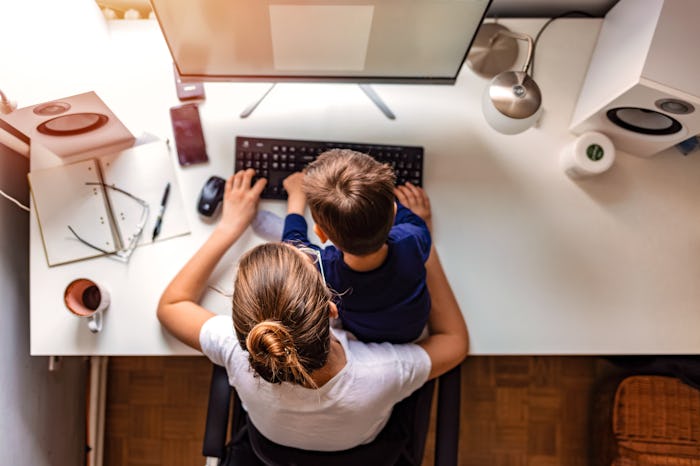Life

It's Maddening, But There's A Sweet Reason Why Your Kid Wants To Sit *On* You All Day
For those of us who have been working from home with small children for a while, this may not be news to us, but for folks recently working from home, you've probably noticed something. No furniture is good enough if your kid can always sit on you instead. They always want to be all up in your grill — especially when you’re trying to work — and it’s almost like they just cannot get close enough and want to physically crawl into your body. Why are they so obsessed with you?
Well, the reason will make you feel a little guilty for all the irritation. Dr. Elizabeth Berger, a child psychiatrist and author of Raising Kids with Character, tells Romper that it’s pretty simple. They just love you. Aw. But also, quit touching me.
On the flip side, it's a good thing for them, too. “It’s healthy for children to want to sit on their parents — they seek affection, warmth, cuddles, physical connection, and they want to be given attention," Licensed marriage and family therapist Katie Ziskind tells Romper. She also says that they ask for attention and display their needs for physical attention by sitting on an adult’s lap.
It’s also just a primary way for humans and animals to connect to one another, according to Dr. Laura Vogel, a licensed psychologist and director of therapeutic services at Momentous Institute in Dallas. And this starts as soon as they’re born. “When children are infants, they spend large amounts of time in our arms and laps. This intimate time together is where children are fed, entertained, and comforted. Our laps become a safe space associated with warm, loving emotions. It’s where children learn to regulate their bodies and calm big emotions. We see children return to our laps as a way of connecting or receiving a moment of reassurance,” she says.
Vogel adds that most of the time the reasons our kids are constantly trying to get in our laps is obvious. But other times, the “why” is less obvious, which makes parents feel a little overwhelmed and frustrated. When you are feeling frustrated, Vogel says there are positive ways to redirect their behavior, and she says it’s important to first consider your child’s age. If they’re under the age of 3, they really do need these moments of connection, Vogel says. “They’re still learning how to handle their own emotions and need an adult to support them."
But as your kid gets older, Vogel says there are ways to provide them with this reassurance and connection while still teaching them about personal space. "One approach is to simply say, ‘Right now, my lap is not for sitting on, but you can sit next to me.’ During this time, really focus on your child. Hug them, make eye contact — give them what they are seeking. If you redirect them to sit next to you and then continue whatever you are doing, your child will naturally seek more connection – meaning they will likely crawl in your lap,” Vogel says.
But if you go back to why children seek us out and give them that connection by letting them sit next to you, that "need" is filled in a different way.
This may take a lot of practice because habits take a while to shift, says Vogel. “What I typically see — and may have even been guilty of myself at one point or another — is a parent becoming frustrated and overwhelmed and scolding their child for crawling in their lap. What this typically produces is a child who feels confused, upset, and possibly even scared. And what do children want when they feel this way? Connection with their parents. So the frustrated redirection can actually increase a child’s desire to be in our laps.” So getting angry at them for needing to be on you at all times backfires and makes them want to be on you even more.
Thankfully the effects of just letting them sit in your lap whenever are minimal — at least for the child. They’ll eventually want more independence and will learn to self-regulate, according to Vogel. This change in behavior typically happens when they’re 3 or 4 years old, but she says, “There will also be times when older children will naturally seek out our laps. We typically see this at bedtime and other moments when we slow down. There are also individual differences to how long children will want this connection."
But don't panic about why your child wants to be in your lap or think there's something wrong. Berger says it's totally normal and healthy, it's just a lot sometimes for a parent who's tired of being their child's personal gym. "Relationships with children — even children as small as 1 or 2 — are two-way streets. Children deserve to be treated with respect and to be told in a friendly way that the grown-up has had enough now."
Experts:
Elizabeth Berger, child psychiatrist, author of 'Raising Kids with Character'
Katie Ziskind, licensed marriage and family therapist
Laura Vogel, Ph.D., licensed psychologist, director of therapeutic services at Momentous Institute